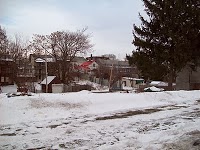Last Friday, John Mason reported in the Register-Star that one of the resolutions to be taken up by the new Council is one approving the sale of half the community garden at Columbia and Second streets to Habitat for Humanity: "Council to vote on transfer of Garden land to Habitat." The article reports a disagreement between former Fifth Ward alderman and majority leader Cappy Pierro and Habitat executive director Brenda Adams about the last time HCDPA (Hudson Community Development & Planning Agency) sold land to Habitat. Pierro said it was 1989; Adams said it was 1998. Adams was obviously right. Columbia County Habitat for Humanity didn't exist until 1993.
While it may be true that HCDPA hasn't sold land to Habitat for fifteen years, it is not the case that Habitat has obtained land from the City of Hudson or one of its quangos more recently than that. On January 19, 2011, Gossips reported that Council president Don Moore, battling a bad cold or worse, had worked throughout the day to ensure that there would be enough aldermen present at the Common Council's regular monthly meeting to make a three-quarters majority, and that the aldermen had "braved icy streets and sidewalks," some aided by cross-country ski poles, to get to City Hall. The meeting could not be postponed or cancelled because, back in January 2011 as it is now, grant money for Habitat hung in the balance, and the pressure was on for the Council to act so that Habitat could be assured its land.
There was one difference in the land transfer that happened three years ago. Habitat didn't pay for the land, or if they did, it was only a token amount, like a dollar. In Mason's article, Adams is quoted as saying that paying $5,000 for land assessed at $25,000 was "a departure from our normal purchase situation." The article goes on to report: "In looking forward to a more sustainable relationship with the city, [Adams] said, the organization felt it could reach deep into its not-well-lined pockets for money it hadn't budgeted." But how sustainable is Habitat's relationship with Hudson?
At the December 19 meeting of the HCDPA board, Pierro, longtime aide to former mayor Rick Scalera, bemoaned the fact that Hudson was "running out of space." "We have to come up with more space," said Pierro, "so Habitat can fulfill their mission." Some wonder why an organization that calls itself Columbia County Habitat for Humanity is fulfilling its mission almost exclusively in Hudson. The organization, which was founded in Chatham in 1993, completed its first house in Chatham in 1997. Habitat has built one house in Copake but all the rest--eleven new houses and two rehabs--have all been in Hudson. The reason for this, Adams told Gossips a couple of years ago, is that Hudson gives them land.
When making the case for Habitat getting all the land on which the community garden is located, Adams talked of families rescued from substandard housing thanks to the work of Habitat. There is no arguing the importance of improving people's lot, but the problem is that, after a family has moved out of a substandard dwelling, the substandard dwelling still exists, to be occupied by another family who will need to be similarly rescued, and when the plan for rescue involves building single family homes, in a city with a geographic area of less than two square miles, you're going to run out of space to build houses. This is the problem encountered by the plan to replace Bliss Towers. Unless the City is contemplating another reign of demolition, there isn't enough space in Hudson to replace the 132 units in a nine-story apartment building with two-family townhouses.
It is obviously not within Habitat's mission or capability to build multifamily dwellings, but it has often been suggested that Habitat could make a more significant contribution to the community as a whole by rehabbing existing houses rather than building new ones. A recent brochure celebrating Columbia County Habitat for Humanity's twentieth anniversary claims that Habitat volunteers have built thirteen houses in Hudson. Two of those were rehabs--one on the 200 block of Allen Street and one on Harry Howard Avenue--but the brochure seems to gloss over these two projects focusing instead on the new houses: five on Mill Street, two in the 400 block of Columbia Street, and four in the 200 block of Columbia Street.
A couple of reasons are given for why Habitat prefers new construction to rehabbing existing houses. When asked about rehabbing at an HCDPA board meeting, Adams said that Habitat volunteers did not have the skills needed to rehab houses, probably having in mind dealing with issues like asbestos and lead paint. Another reason sometimes offered is that the price of houses in Hudson--even those in need of work--has risen too high. It seems that building something new on donated land is the only way Habitat can make its financing scheme work. Still, in a city like Hudson, where there is very little available land and many existing houses in need of rescue, stabilizing and restoring structures that are part of the city's original architectural fabric seems preferable to building new.
COPYRIGHT 2014 CAROLE OSTERINK




Completely agree. Rehab the old.
ReplyDeletewe need to think about 3 and 4 family buildings in the small space we have left
So one family gets housing while many families perhaps lose their ability to supplement their nutritional needs. Doesn't seem like Habitat for Humanity cares beyond their own building portfolio. Hypocrites!
ReplyDeleteCompletely agree. Habitat seems to be working against building community. Shameful
DeleteActually there are examples of Habitat building multi-family projects, like this one in Daly City near San Francisco. (The article refers as well to a smaller earlier one in SF.) Habitat does a wonderful thing. But the American-dream idea that every family should have a single-family house is hardly appropriate any more, and especially not in a dense environment like Hudson's. http://www.housingfinance.com/affordable-housing/05172013-change-of-habit.aspx
ReplyDelete